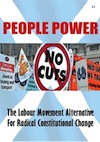As the Scottish independence debate heats up, PAULINE BRYAN argues that the status quo within the Union, devo max, devo plus and the SNP version of independence are each built on a neo-liberal model of economics. In their own ways, she says, they prevent even a classical social democratic approach to fiscal policy and the stimulation of economic growth.
There are, of course, socialists who support independence, but unless there is a radical change in the power of capital, it is capital that will continue to dominate our political institutions in whatever form they take. Scotland on its own will find mounting a challenge to that power much more difficult.
However, it will be a missed opportunity if the Labour movement involves itself in a negative campaign in alliance with Tories and other reactionary forces and only points out the flaws in the independence case. We need to build resistance to the status quo within the Labour movement and beyond. We should draw the lessons from the damage being inflicted across the UK because of the failure of capitalism and ask questions about the type of society we want to see, here in Scotland, in the UK as a whole and across Europe.
The object of this alternative should be to create the conditions where the power of capitalism and the use of markets can be brought under democratic control. The purpose of achieving democratic control would be, firstly, to enable a variety of forms of public ownership to build a sustainable and secure economy and, secondly, to redistribute wealth from the super rich to the rest of the population and, geographically, from areas of greater wealth to areas of need.
Our argument is that neither an independent Scotland nor the status quo can deliver this. It will require a fundamental transformation of our democratic structures. The devolution of power to Scotland and Wales and the structure of the Northern Ireland assembly have, for good or bad, broken the centralised grip of Westminster on policies, but we need a mechanism that does not turn the UK into four neo-liberal economies vying with each other to be the lowest taxed and the lowest paid. We need to turn the diversity into a means of strengthening the power of working people.
Home Rule
This year, 2012, happens to be the centenary of the introduction of the last in a series of Irish Home Rule Bills. While the Act eventually passed in 1914 was amended to include the possible exclusion of parts of Northern Ireland, in its original form it gave a framework for how devolved parliaments could be accommodated within a United Kingdom.
The Act would have created a two chamber Irish parliament with the power to deal with all issues that related to Ireland while leaving control of the military, the crown, foreign policy and customs duties at Westminster. The number of Westminster MPs representing Irish constituencies would have been reduced from 103 to 42. Importantly, as Ireland had a net deficit, there was to be an annual “transferred sum” ensuring some degree of redistribution from wealthier England to Ireland.
 This model for Home Rule was used by the Scottish TUC and Labour Party in Scotland as a basis for demands for Home Rule for Scotland. The STUC, founded in 1897, first formally adopted a policy of support for a Scottish parliament in 1914. The Independent Labour Party from its inception in 1893 had a commitment to Home Rule and played a prominent role within the Scottish Home Rule Association. Their demands were for a federal arrangement rather than for independence. When George Buchanan (left) moved the Scottish Home Rule Bill, introduced in 1924, it was modelled on devolution as it operated in Northern Ireland.
This model for Home Rule was used by the Scottish TUC and Labour Party in Scotland as a basis for demands for Home Rule for Scotland. The STUC, founded in 1897, first formally adopted a policy of support for a Scottish parliament in 1914. The Independent Labour Party from its inception in 1893 had a commitment to Home Rule and played a prominent role within the Scottish Home Rule Association. Their demands were for a federal arrangement rather than for independence. When George Buchanan (left) moved the Scottish Home Rule Bill, introduced in 1924, it was modelled on devolution as it operated in Northern Ireland.
The then Labour government gave the general principle of the Bill its approval, but failed to allow time for its progress through the Commons. Under the terms of the Bill the Westminster parliament had responsibility for the Post Office, the military, customs, foreign affairs and tax collection. There was to be no reduction in the number of Scottish MPs in the House of Commons, but Scottish members would abstain from voting on English matters. A joint exchequer board would allocate finances.
In moving the Bill, ILP member George Buchanan drew attention to the minutiae of Scottish issues that had to be dealt with in the House of Commons, and how he as a Scottish MP was able to vote on matters such as the London Traffic Bill. He stated:
“The English Members can rid themselves of Scottish representation as soon as they care to, for in our Bill we make this proposal, that whenever there is a scheme of devolution agreed on, to apply to England, Scotland and Wales, the Scottish Members will cease to take any part or interest in the affairs in which the English parliament ought to take part.”
The Labour movement’s position, unlike the nationalist one, acknowledged the bonds the British working class had forged in two centuries of political struggle and recognised shared class interests over and above the shared interest of living in Scotland. Far from wanting to separate from the English they wanted to join with working people across the islands in creating a socialist alternative. While campaigning for the devolution of powers the early pioneers adopted internationalism as their ideal, but wanted devolution of powers to create democratic federalism.
The STUC continued its support for Home Rule and then for devolution, but many of its unions operated across Britain and some into Ireland. A delegate from the Scottish miners (which supported Home Rule) demanding a UK wages board at the 1921 congress, stated that “socialism, like capitalism, should know no boundaries and should look to the day when workers of all countries would become one great industrial organisation”. From the turn of the 20th century onwards, the Labour movement’s demands for a Scottish parliament were to enable it to tackle poverty, poor housing, inadequate public services and industrial closures and not for its own sake.
A dual approach
Now that we have the Scottish parliament, Welsh and Northern Irish assemblies we have the basis for a federal arrangement with power devolved within the UK, but with the strength of a single parliament dealing with macro economic issues and international relations. This dual approach will allow variations in policy within the constituent parts, but retain the combined strength to operate within the global economy.
What might a democratic federalist arrangement mean for Scotland? For a start it would resolve the West Lothian question. Scottish representatives would have the right to vote on issues that impacted on the UK as a whole and on Scotland in particular. They would not have the right to vote on issues that relate only to England or other parts of the UK. It would, however, safeguard the ability to redistribute wealth within the UK and allow the Labour movements in the whole UK to collaborate in resisting attacks on working people. It would lessen the likelihood of a race to the bottom in making Scotland a low pay, low corporation tax economy. It would reduce the extent of the London-centric nature of the Westminster parliament which is as damaging to Lancashire as it is to Lanarkshire.
In another article in theRed Paper Collective’s People Power pamphlet, Dave Watson outlines a model of fiscal devolution which, unlike devo max and devo plus, allows for a progressive approach to taxation. This would give a Scottish government powers to redistribute wealth within Scotland, but also allow for redistribution within the UK. The power held by the Scottish parliament could be used more flexibly to create a fairer tax system, both nationally and locally, which could improve public services, and the pay and conditions of public employees, and make requirements on private sector employers to pay a living wage.
We should support the extension of the capacity to borrow for capital and revenue purposes that go well beyond the limits set out in the Scotland Act. This should be used to end the Scottish parliament’s dependence on PPP, PFI or the Non-profit Distributing Projects of the present Scottish government.
A Scottish parliament should, in appropriate situations, have the right to take land and enterprises into public control. These rights could be used to safeguard jobs and industries or where the best interests of those dependent on the land or the enterprise are in jeopardy.
A Scottish government should be able to create publicly owned enterprises to rebuild Scotland’s industrial base on green technology, renewable and high value manufacturing; address unemployment black spots; and create a more prosperous future for the people, especially the young people, of Scotland.
What we acknowledge is that since the establishment of the Scottish parliament, and greater powers going to the Welsh assembly, there will inevitably be change at Westminster. The Tories are dodging the West Lothian question, but it will not go away.
Carwyn Jones, leader of the Welsh assembly, has called for a constitutional convention for the UK. He states, “…for me, devolution is not about how each of Wales, Scotland and Northern Ireland are separately governed. Rather it is about how the UK is governed, not by one but by four administrations, and which are not in a hierarchical relationship one to another.”
He also states: “Representatives of all the states should come together and agree amongst themselves what limited range of powers should be conferred ‘upwards’ on the federal authority.”
Both the STUC and the Scottish Labour Party are establishing commissions to consider the case for greater powers for the Scottish parliament. Both organisations state that the criterion used to support a position will be whether it is in the best interests of the people of Scotland.
As Stephen Smellie of UNISON said at the STUC Congress in April: “The answer to all these questions is not a flag, a border or even a list of powers in Edinburgh and London; it is what you intend to do with these powers and for what purpose.”
—-
 Pauline Bryan is a member of the Red Paper Collective. This article was originally published in the group’s September 2012 pamphlet, People Power: The Labour movement alternative for radical constitutional change.
Pauline Bryan is a member of the Red Paper Collective. This article was originally published in the group’s September 2012 pamphlet, People Power: The Labour movement alternative for radical constitutional change.
The role of the Red Paper Collective is “to influence the debates within the Labour and trade union movement and to ensure that the weight of the movement is united behind a commitment to make the politics of class, not nation, the driving force in Scotland”.
Website: www.redpaper.net
Twitter: redpaperscot


